
Things fall. If they are small, it is difficult for a Stargardian to find them again. The ears help, but sometimes they need a broom.
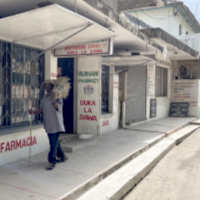
 Sometimes I feel like a secondary illiterate: I learned to read in school, but thanks to Stargardt I can hardly use it when I walk through the streets.
Sometimes I feel like a secondary illiterate: I learned to read in school, but thanks to Stargardt I can hardly use it when I walk through the streets.
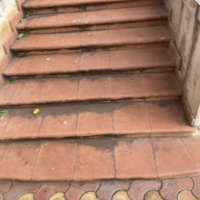
 It seems that many stairs in Kenya are built somewhat haphazardly and don't adhere to a general ruel. As a result, I had to learn how to climb stairs twice.
It seems that many stairs in Kenya are built somewhat haphazardly and don't adhere to a general ruel. As a result, I had to learn how to climb stairs twice.
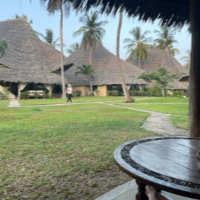
 It's nice to know your neighbours and greet them when you meet in the stairwell. However, when the stairwell becomes a garden, a stargardtiens have some problems.
It's nice to know your neighbours and greet them when you meet in the stairwell. However, when the stairwell becomes a garden, a stargardtiens have some problems.
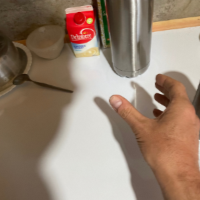
 Many kitchens in Kenya have only one light: centrally mounted on the ceiling. This sometimes makes it difficult for a Stargardtien to work in the kitchen because he gets in his own way.
Many kitchens in Kenya have only one light: centrally mounted on the ceiling. This sometimes makes it difficult for a Stargardtien to work in the kitchen because he gets in his own way.
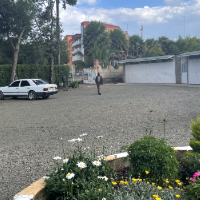
 Stargardtiens always take a little longer to realise what is in front of them or what is happening. This is sometimes unpleasant because they have no warning, are surprised and have to react spontaneously. But it also protects them from making rash judgements.
Stargardtiens always take a little longer to realise what is in front of them or what is happening. This is sometimes unpleasant because they have no warning, are surprised and have to react spontaneously. But it also protects them from making rash judgements.
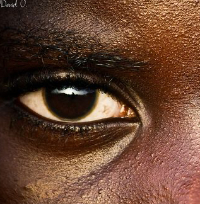
 It is polite and decent to look your counterpart in the eye. But as a Stargardtien, that's not so easy. The customs in other countries though can be to one's advantage.
It is polite and decent to look your counterpart in the eye. But as a Stargardtien, that's not so easy. The customs in other countries though can be to one's advantage.
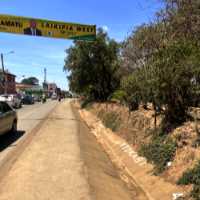
 It's an election year in Kenya. The official nomination is near, the candidates have been positioning themselves for a while. Among other things, the president, the parliament and the provincial governours will be elected. As we were recently driving through the city, a colleague asked me what I think of all the banners on the houses. I had to ask what she meant exactly.
It's an election year in Kenya. The official nomination is near, the candidates have been positioning themselves for a while. Among other things, the president, the parliament and the provincial governours will be elected. As we were recently driving through the city, a colleague asked me what I think of all the banners on the houses. I had to ask what she meant exactly.

 Sometimes when I'm out with people, I'm reminded of what I can't see anymore. It's often not that tragic, but every now and then there are small things that I realize I miss. Just like recently on the nature trail.
Sometimes when I'm out with people, I'm reminded of what I can't see anymore. It's often not that tragic, but every now and then there are small things that I realize I miss. Just like recently on the nature trail.
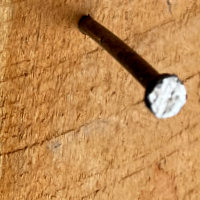
 Stargardtiens have to constantly compensate for the reduced sense of sight. The next best channel of perception is hearing. And you can get quite far with it as I recently realised again while hammering in a nail.
Stargardtiens have to constantly compensate for the reduced sense of sight. The next best channel of perception is hearing. And you can get quite far with it as I recently realised again while hammering in a nail.

 Stargardt changed my table manners. Fortunately, the customs in Kenya suit me in that regard.
Stargardt changed my table manners. Fortunately, the customs in Kenya suit me in that regard.
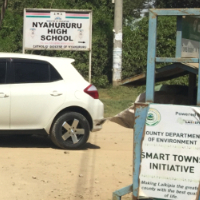
 As a Stargardtien, the sense of listening is more important than vision. The sounds around you can tell you much about what is going on. Even if you just sit on the porch of your house. The following newsletter features an audio recording of a typical Sunday in Nyahururu.
As a Stargardtien, the sense of listening is more important than vision. The sounds around you can tell you much about what is going on. Even if you just sit on the porch of your house. The following newsletter features an audio recording of a typical Sunday in Nyahururu.

This is a short one: Recently I met a friend who works in adult education. The new semester had just started and due to the current COVID-situation, the students were required to wear masks. My friend mentioned how difficult it is to recognize his new students and learn their names because of those masks. Well, for a Stargardtien this is the steady-state: Even when people don't wear masks they are difficult to recognize.
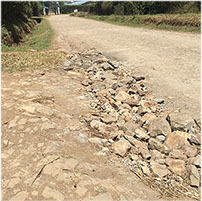
 I recently noticed that the majority of the time I am walking around Nyahururu with my head bowed down. This has nothing to do with my state of mind, rather the nature of the ground demands my full attention.
I recently noticed that the majority of the time I am walking around Nyahururu with my head bowed down. This has nothing to do with my state of mind, rather the nature of the ground demands my full attention.
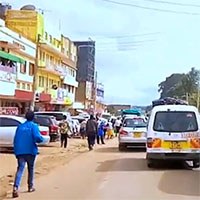
 I've been here in Nyahururu for two years now and sometimes I still get the question of how I dealt with the culture shock. My answer is usually: Sorry, but I didn't encounter that one yet. Now I've found out how a culture shock expresses itself and read things like "Adaptation to the unknown", "Feelings of insecurity" or "Orientation systems". Doesn't that sound like Stargardt?
I've been here in Nyahururu for two years now and sometimes I still get the question of how I dealt with the culture shock. My answer is usually: Sorry, but I didn't encounter that one yet. Now I've found out how a culture shock expresses itself and read things like "Adaptation to the unknown", "Feelings of insecurity" or "Orientation systems". Doesn't that sound like Stargardt?
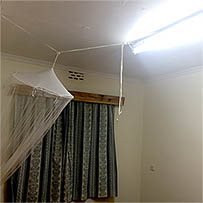
 As a Stargardtien, you develop a feeling for light. You will immediately notice differences in light or insufficient lighting. For me, the question arises whether there are also cultural differences.
As a Stargardtien, you develop a feeling for light. You will immediately notice differences in light or insufficient lighting. For me, the question arises whether there are also cultural differences.
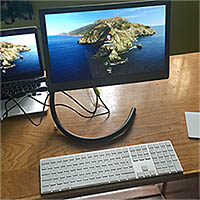
 For once a technical contribution: As a Stargardtien, I can't do much with a laptop: The screen is too far away to work comfortably. The enlargement software helps a little, but it usually ends with back pains because I have to bend over the device. So all that remains is a permanently installed monitor of the correct size and height. Or isn't it?
For once a technical contribution: As a Stargardtien, I can't do much with a laptop: The screen is too far away to work comfortably. The enlargement software helps a little, but it usually ends with back pains because I have to bend over the device. So all that remains is a permanently installed monitor of the correct size and height. Or isn't it?
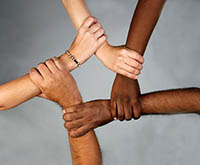
 When you are one of the few Europeans in a small Kenyan town, you get notices. Conversely, as a Stargardtien, I often only notice a different skin colour in hindsight.
When you are one of the few Europeans in a small Kenyan town, you get notices. Conversely, as a Stargardtien, I often only notice a different skin colour in hindsight.
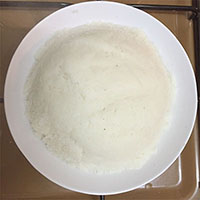
 The colour of the plate helps to see what is edible on it (see the article “What am I eating there?”). In Kenya, I had to revise my preference for white plates. And since some dishes are eaten with the fingers, new challenges emerged for a Stargardtien.
The colour of the plate helps to see what is edible on it (see the article “What am I eating there?”). In Kenya, I had to revise my preference for white plates. And since some dishes are eaten with the fingers, new challenges emerged for a Stargardtien.
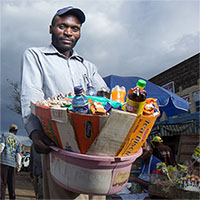
 The street vendors are sometimes a bit pushy, especially when they appear in bulk, such as around a Matatu station. As a Stargardtien, I have a built-in “deterrent”.
The street vendors are sometimes a bit pushy, especially when they appear in bulk, such as around a Matatu station. As a Stargardtien, I have a built-in “deterrent”.
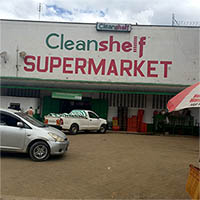
 It is not always easy for Stargardtiens to recognize what a market woman or a shop offers. And the name of the shop doesn't sometimes help either.
It is not always easy for Stargardtiens to recognize what a market woman or a shop offers. And the name of the shop doesn't sometimes help either.

 If one's own currency is sometimes not clearly distinguishable, how will it be with an unfamiliar one? The current Kenyan bills series has been in circulation for quite a long time and you can see that: they are very hard to distinguish.
If one's own currency is sometimes not clearly distinguishable, how will it be with an unfamiliar one? The current Kenyan bills series has been in circulation for quite a long time and you can see that: they are very hard to distinguish.
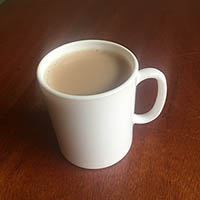
 The views when a cup is full are different in different cultures. I found out that as a Stargardter I can get into an insoluble situation when filling a cup.
The views when a cup is full are different in different cultures. I found out that as a Stargardter I can get into an insoluble situation when filling a cup.

 Not unexpectedly, traffic is a problem in Kenya. This also worried my Kenyan colleagues the most, before I came here. Traffic rules are only roughly adhered to and the principle of letting the weaker road users take precedence is not very common.
Not unexpectedly, traffic is a problem in Kenya. This also worried my Kenyan colleagues the most, before I came here. Traffic rules are only roughly adhered to and the principle of letting the weaker road users take precedence is not very common.

After a while without posts, I resume blogging. The reason for this is my three-year stay in Kania. Just over a year ago, I came to Nyahururu, a small town in the centre of Kenya, to help out with two socially engaged organizations as part of a personnel development cooperation program organised by the Swiss NGO Comundo.
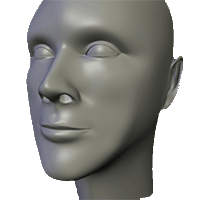
When I sit at a table and a person is looking straight at me, I do not see her face. So I peer past her with both eyes to see her head and at least roughly recognize her face. The finer features of a face are not recognizable to me at least, at this distance. This means that I can not use faces to recognise people.

Sometimes the little things became suddenly a challenge. For example, lighting a candle. The long thin ones are not a problem. But the short thick ones....

There are situations where I puzzle over a remark or behaviour of people around me. This is not surprising in itself, to Stargardtians this happens frequently and constantly. The solution to the puzzle is always that I lacked a visual cue, or I've simply not seen the triggering event.
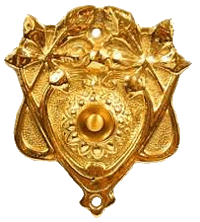
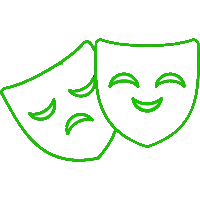
For Stargardtiens faces are difficult to recognise. It is usually already a challenge to figure out if the person is looking at you or not. The distinguishing of facial expressions is only possible in particularly good light and only when the facial expressions are clear. This is an limiting factor when dealing with other people.
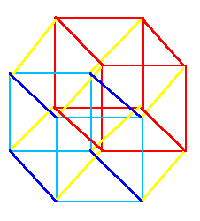
Stargardt also has an impact on the perception of space. I do not mean the simple oversight of an object on my walking way or on the table. There are moments where the whole space around me loses its third dimension.

Between searching and finding is there's usually seeing. Occasionally also listening. For a Stargardtien it's usually knowing. And often feeling one's way.
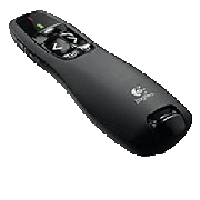
It's surprising at first glance, what is achievable in the office in spite of Stargardt. On closer inspection however there are several obstacles that can be difficult to handle, especially when directly cooperating with other people. It starts with the simple reading of files and stops at the blind presentation.

Also, the detection of stains and dirt has its pitfalls. Often there's only a systematic approach - all or nothing. And sometimes the season helps.

The modern mobile phones offer a wealth of useful tools and features for Stargarsters, starting with the electronic map or the use as a flashlight or magnifying glass up to the text reading features. Nevertheless, they also have some serious disadvantages.
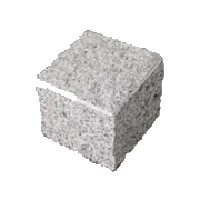
As Stargardter stumbling is part of everyday life. Curbs, stairs, roots or just things that are in the hallway on the floor, and were not there when I went by there the last time. You get used to this fact as such and the occasional blue toe associated with it. But: You can also stumble over other things than objects.
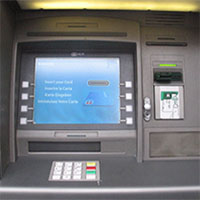
ATMs - here as representative for all other automates such as tickets, self-checkout at the grocery store, or check-in at the airport - have evolved considerably since their introduction. But despite all the improvements they are always good for surprises.
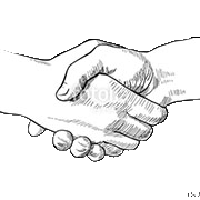
On many occasions in daily live eye contact is important. It signals attention, respect and sincerity. Or it signals the driver that I want to cross the street or the waiter in the restaurant that I want to pay. As Stargarster that is not quite as straight forward as it sounds.
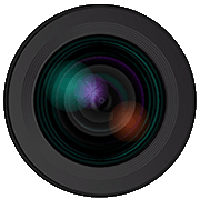
It seems strange at first glance that a Stargardter like me puts so much time and effort into photography. But I have learned to use my poor eyesight as a strength here. The fact that I see less, makes me see more of my subjects.
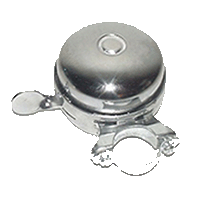
Obviously, traffic is a problem. I've given up riding a bike a while ago after I've overlooked and rammed a parked car. As a pedestrian, I've got a little more reaction time, because I'm slower. The basic problem is that an oncoming vehicle can be completely invisible to me if my blind spot happens to fall on it.

My eye doctor tells me regularly that my eyesight is at 10%. This is determined by the usual letters and numbers in various sizes, which are projected on the wall. Sometimes you can still see the panels with the many E's showing to the left, right, up or down. The largest are at the top, towards the bottom they are getting smaller. 10% equals the top two or three lines that I can still see. With my glasses, of course, without glasses, I don't see a thing on these panels. But what means 10% then?
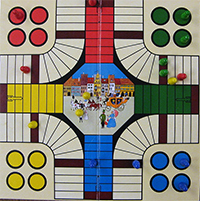
About fast objects that I am confronted with (e.g. cars) and the associated difficulties I have spoken before. The same applies vice versa when I myself am quickly moving: I see things too late or react too late.

Seeing is like any perceptive process is selective. We see certain things consciously other we overlook. This is useful protection against an otherwise not hand able information overload. But what astonishes me again and again how punctually people see.

Shopping also has its pitfalls. I don't particularly like the serviced counters. The goods are usually presented very nicely behind the glass, but I can only roughly see what they are, not to mention the prices. I can only say: - I would like a piece of that, please. And I point to it. This is a shame, since the same range of sausage or cheese is not always packed in the refrigerated section. But I can also make it a little adventure by simply pointing at something without knowing what it is and letting me surprise what I get. Like this, I discover something new..
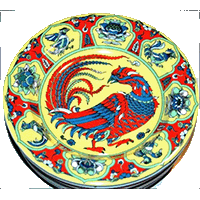
A beautifully set table or a sumptuous buffet is a fine thing. However, for stargardters, they hold some surprises, with which the cooks or hosts die probably not expect: Strange menu combinations or poking around on an empty plate.

An effect of Stargardt is that it is sometimes not so clear who or what I'm looking at. If I want to fix something or look at someone, I need to specifically look next to it with both eyes to see anything. I'm cross-eyed with both eyes at the same time. If I look at the object of interest straight forward, it is completely gone and I do not see anything.
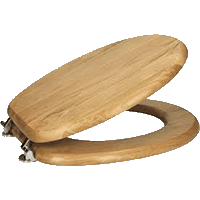
Recently at my place of work, I went to the restroom. When I walked into one of the compartments and got ready for my task, I halted puzzled.- Since when do we have toilet lids? In recent times much has been renovated and re-built in the building and I was prepared to search again for some offices and learn new locations. But the toilets were still in the same place and excluded from the construction work. Then I looked at it a second time, and behold, there was only the usual toilet seat there. My first look at must has been aligned in such a way that my blind spot came to lie exactly on the toilet seat. My brain quickly filled the gap and inserted a toilet lid.
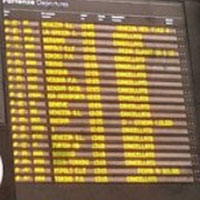
When I 'm travelling, I usually have some binoculars with me, especially when I move into areas I don't know well. I need the binoculars than to read street signs or house numbers. For others, this looks somewhat confusing, as I stand at very unusual places and watch something with my binoculars. On a hike, instead of looking at the view I stand with my back to it and look at the rock wall behind the tail because the signpost is standing there.
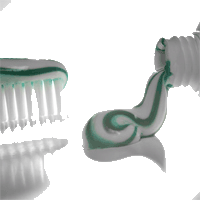
Here is a challenge from everyday life: Try applying white toothpaste to white toothbrush bristles, all against the background of a white washbasin. It was not uncommon for me to get a portion of toothpaste on the white tiles on the floor or on my feet. How to eliminate this problem.